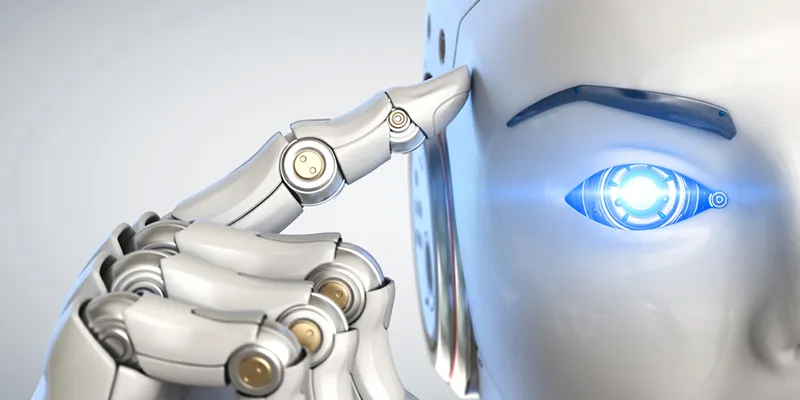Move over traffic, beer: AI is Bengaluru's new talk of the town
Analysts predict that by 2020, AI technologies will be pervasive in almost every new software product and service. According to Gartner, AI will be among the top five investment priorities for more than 30 percent of CIOs.
The world is looking at the startup buzz in India. Interestingly, while India sizzles, Bengaluru is not just a global outpost for software services but is also poised to become the AI capital of India and the world.
The work done in Artificial Intelligence (AI) is highly competitive and ready to go global. But, like with every trend, every second startup now claims to be an expert in AI.
Nevertheless, innovation in AI is picking up at a fast pace. There is an AI solution for everything and it is taking root in Bengaluru. So, the next time you shake hands with someone in Bengaluru, he or she may just say AI!
But it’s not just hype. The city’s engineering talent has even impressed global C-Suite leaders.
“I saw a couple of companies at the IBM event and realised that the work done in India and in Bengaluru is really top notch,” says Bob Lord, Chief Digital Officer at IBM at a company event in Bengaluru.

The confluence of engineers from across the country, in the city, has created a modern day techno-revolution. There is AI everywhere and its use is diverse - it can study yeast breakup in beer fermentation, and also provide solutions for homes and cars.
Related read from 2014- The close friends who brewed the most happening place in Bengaluru — the Toit story
The ideas are new and fresh – talent is young but in just ten years, the scene will change and Bengaluru will boast of some of the most mature AI startups and companies.
At the IBM event, a group of engineers from Manthan showcased the future of retail forecasting with the AI bot Maya. The bot does not just figure out what was sold in the store, on any given day, in any region, but is also equipped to advise the sales teams on how they should prepare for the next day. It enables the marketing team to make dynamic promotions in partnership with brands.
“AI is about data and a lot of work goes towards automating data, this is where our platform is going to be leading globally,” says Atul Jalan, founder of Manthan.
Manthan is a big player and has been around for a decade. But even the smallest of startups are looking at world-class diagnostic and predictive AI.
Lymbyc, a four-year-old startup founded by Satyakam Mohanty, has been building AI for market research.
“Today, companies get so many reports that they are only able to use some portions. The rest of the data goes unused. Only an AI solution can prescribe what the senior management has missed out,” says Satyakam.
The company has five paid pilots in the US and is going to scale up its product over the next year.
It comes as no surprise, then, that the Government of India sees AI as the biggest opportunity to power the nation into the digital era, and has allocated Rs 3000 crore for the same. But before the government of India, the government of Karnataka has set up a Centre of Excellence for AI as part of the startup policy in the state.
“Bengaluru’s centre for excellence for AI will have industry preparing engineers from the state, and startups, to serve global needs,” says Priyank Kharge, Minister of Karnataka. The Centre for Excellence for AI will have a corpus of Rs 40 crore to help startups. Every company from Bengaluru has some sort of AI journey planned.
Related read- Weatherwise & otherwise, Bengaluru is the place to be to ideate, innovate, invest in Karnataka: Priyank Kharge
Andrew NG, cofounder of Coursera, is one of one of the most recognised names in the AI community recently closed a $175M fund to invest in AI companies. He too was impressed with the momentum that AI has seen in India.
IT services companies invest in AI
Even Infosys, the famed IT services company, has a platform for AI and is pushing its use across North American markets. Nia collects and aggregates data into a self-learning knowledge base and then automates repetitive business. Like all AI solutions it is built to solve higher-value industry problems. It is currently used to study exceptions and resolve them in the mortgage industry. The platform is used in retail and in an area of multiple contracts to identify and resolve exceptions. Companies like UBS, Syngenta and Evonik, use the AI platform built by Infosys.
Even Tier-2 IT services companies like Mindtree are investing in AI, by using it to help their retail clients globally. Accenture too announced the launch of new services for testing Artificial Intelligence (AI) systems globally that are powered by a "Teach and Test" methodology designed to help companies build, monitor and measure reliable AI systems within their own infrastructure or in the Cloud.
"As organisations embrace AI, it is critical to find better ways to train and sustain these systems - securely and with quality - to avoid adverse effects on business performance, brand reputation, compliance and humans," says Bhaskar Ghosh, Group Chief Executive, Accenture Technology Services.
According to Gartner Inc, market hype and growing interest in artificial intelligence (AI) are pushing established software vendors (like Infosys and Wipro) to introduce AI into their product strategy, creating considerable confusion in the process. Analysts predict that by 2020, AI technologies will be virtually pervasive in almost every new software product and service. Gartner predicts that by 2020, AI will be a top five investment priority for more than 30 percent of CIOs.
"As AI accelerates up the hype cycle, many software providers are looking to stake their claim in the biggest gold rush in recent years," says Jim Hare, Research Vice President at Gartner. He says that most vendors, unfortunately, are focused on the goal of simply building and marketing an AI-based product rather than first identifying needs, potential uses and the business value to customers."
AI everywhere in Bengaluru
HealthifyMe, a mobile health and fitness platform, has created a largest database of around 100,000 Indian food items that users can track.
It also announced the launch of an AI powered health coach, code named Ria. The company claimed that “Ria” was actually more advanced and personalised than Siri or Google assistant when it came to health related information. Tushar Vashist, CEO of HealthifyMe says,
Google Assistant provides basic answers in a wide variety of areas, but it can’t personalise and go very deep into one area. This is where HealthifyMe’s approach of going inch-wide, mile-deep works.

Then there are chatbot companies that also use Machine Learning (ML). Companies like Yellow Messenger, Racetrack.AI, and Niki.AI are building intelligent chat bots that can handle multiple use cases from bus and cab bookings to movies and mobile recharges over a chat interface.
So, what is the opportunity cost for the city and its obsession with AI? There may be several companies that claim to be doing AI, but in many cases they may be just machine learning companies. “Startups have to understand that they need data for AI and that today they do not have the resources to go after every corporate individually to use their data and create a learning model,” says M R Srinivasaprasad, CEO of Philips Innovation Centre. He adds that startups can work with Philips to work with several hospitals.
Philips, in Bengaluru, has developed an AI-based solution to detect TB which helps reduce the workload on radiologists and makes their work less subjective. Given a set of chest X-rays, the algorithm is able to detect if there are traces of TB in the image. The solution learns TB-specific features from the images which are unique in chest X-rays using deep learning techniques and then use machine learning algorithms to generate models that can distinguish a chest X-ray that contains TB traces from the normal ones.
There is also Actify Labs, which finds exceptions in radiology images, Embibe, which uses AI to improve learning outcomes and then there is AIbono, which uses AI to cropping conditions to improve yield.
Now, the question is whether AI will change our lives, or maybe hopefully, even reduce Bengaluru’s traffic jams. Where does your AI journey begin? Most definitely in Bengaluru.







